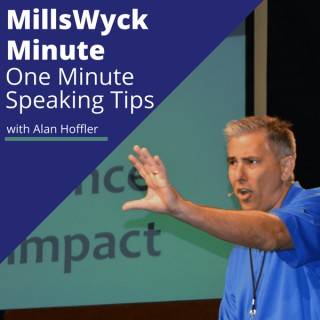MillsWyck Minute: One Minute Speaking Tips with Alan Hoffler
Follow MillsWyck Minute: One Minute Speaking Tips with Alan HofflerOne minute Speaking Tips for the busy speaker with Alan Hoffler. Alan is a public speaking coach, keynote speaker, trainer, Executive Director of MillsWyck Communications, and author of Presentation Sin: The Practical Guide to Stop Offending (and Start Impressing) Your Audience.
- Jan 5, 2022 LATEST EPISODE
- monthly NEW EPISODES
- 1m AVG DURATION
- 79 EPISODES
Latest episodes from MillsWyck Minute: One Minute Speaking Tips with Alan Hoffler

How to go bigger in your gestures for a positive audience response.

Why PowerPoint is NOT your presentation (and ensuring you are the central focus of the presentation).

Dealing with lights in your eyes and being unable to see the faces of the audience.

How to use data and numbers appropriately and with meaning.

Don't drive people away with dogmatic positions that allow them to easily dismiss you.

Seek clarity and make it easy for your audience to process your favorite colors in your presentation.

Stop selling and presenting features and move quickly to benefits to see your audience respond.

Get your eyes on the people you're talking to. And stop reading your slides.

You cannot share everything you know with your audience, keep it simple and let them ask questions.

Skip the introductions and talk about the reason you're there.

When it comes to speaking, it's not practice if it's not out loud.

When speaking with visuals, your pictures need to be high quality.

As a speaker, first impressions are key to get your audience to listen to what you have to say.

Standardizing the fonts of your presentation makes it easier to process information.

When things go wrong, you have three options of how to approach the situation.

Don't assume things about your audience, research and find out.

Make sure your audience knows why they are there before you dive into your content.

Find your one thing before you do anything else in crafting your message.

Getting rid of the continued thought helps the audience to process and to understand.

Electronics are helpful, but to synthesize thoughts and be creative, go analog.

If you have limited time, and you do, focus on the critical spots. The open and the close are worthy candidates.

Instead of taking time away from your duties on stage, hire a helper.

Unless you’re one of the very very few, go bigger with your voice and your expressions.

Never turn down a chance to speak, or an opportunity to get better. Educate yourself and face your fear.

Create and edit your presentation at full size, then reduce it and compress your pictures once, right before you publish it.

If the goal of your speech is to get the audience to repeat some or all of your message, then you need to employ some sort of structure.

A single word or phrase can completely undermine a message or cause. When in doubt, leave it out.

Change your objectives and you will change the outcome of your presentations.

Make sure they remember you for all the right reasons. Behave even when it's not your turn to talk.

To get your message across to your audience, become who they need you to be.

Balancing your points throughout a presentation is key to having an attentive audience and memorable presentation.

Improving your sound is the first step at improving your online communications.

Stop talking about talking, and get right to your point.

How do you manage your time on the fly? Surprising tips for real time management.

Do you get nervous when you present? Everyone does, especially when the stakes are high. Here are 3 tips for calming your nerves.

Every audience is different. Hold audience interviews BEFORE you speak. It’s well worth your time!

Just because you make the same speech doesn't mean it has to be a carbon copy of your last performance. Tailor your message to your audience.

How to ensure the stories you tell from the stage are relevant so they connect with your audience.

Your audience needs transitional flags. How do you transition from one point to another during your presentation or speech?

What is a callback and how should you use it. Though you’re a “speaker” – when does it make sense to interact with your audience?

We each have unique life experiences. There's one key way to differentiate yourself as a speaker during your presentation.

One key tip to save yourself from saying the wrong thing.

Audience feedback is critical for preparing future content. A tip on how to get better feedback from an audience member.

Don't cram all of your knowledge and ideas into one speech.








